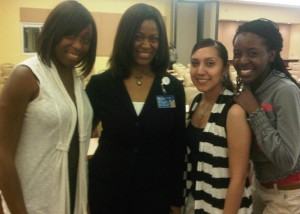
L-R: Shaquita, Dr. Carla Pugh, Megan, and Nicole
The Oncofertility Summer Research Fellowship 2010 is now in full swing (check out this post for more details)! Our three Oncofertility Saturday Academy alumni undergraduate students, Nicole Miles, Shaquita Webster, and Megan Romero have been hard at work, both at the bench in Dr. Woodruff's laboratory and learning about many social issues surrounding women's health and oncofertility. Last week, Dr. Carla Pugh presented her work on the use of technology to improve clinical skills education at the IWHR Monthly Research Forum, and Shaquita, Megan, and Nicole wrote the following post on their thoughts about the event. Enjoy!
On June 22, 2010 at the Institute for Women’s Health Research Monthly Research Forum, Carla Pugh, MD, Assistant Professor of Surgery and Associate Director of the Center for Advanced Surgical Education here at Northwestern University, spoke about some of the anxiety and concerns first year medical students face when performing pelvic, prostate, and breast exams. She stated that the major reason many medical students are so apprehensive to administer these ‘intimate’ exams is due to their lack of experience, as many are fresh out of college. As a first year medical student they are bombarded with information on the anatomy of the human body. However, in order to become a good physician one must not only have an understanding of the human anatomy but also how to perform a physical examination.
With this knowledge Dr. Pugh developed numerous pelvic, prostate, and breast anatomic models linked to sensors. These sensors are linked to computers that display where and how much pressure is applied to various anatomic features of the pelvic, prostate, and breast models.
Dr. Pugh demonstrated that the leading cause of anxiety for second year med students was fear of missing a lesion. Due to breast cancer’s prominence in women, the fear of missing something during a clinical breast exam can be a particularly anxiety-causing. Dr. Pugh also commented on the differences between the ways that clinical breast exams are performed by male and female practitioners, in terms of the time spent and amount of pressure used during the exam.
What makes the mannequins so amazing is that the sensors are placed inside model’s vagina or rectum, and as students' fingers move along the anatomy, they can see the location of their hands on a screen. "When you put your finger in someone's rectum for the first time, you think you know where the prostate is, but you don't," Pugh said. "Several things in medicine are assumed to be learned in time, but I think we can do better than that. You can't teach everybody everything in a lecture format."
Dr. Pugh’s inventions have revolutionized the world of medicine in various ways. But there was one thing that she had not mentioned. After the seminar, we asked Dr. Pugh how her models are used outside of the classroom and whether they are available to local community centers so that women who don’t have the resources to get to a doctor can visit the center and teach themselves how to perform the exam. We believe the breast models, in particular, would be beneficial to individuals in the community. If women are able to give exams on the models it will help encourage self breast exams and promote early detection. While she was amazed by such a great thought, her response was that she had not had the opportunity to do so.
After a discussion with Dr. Pugh, we were interested in finding a way to get the breast models out into the community. Throughout our fellowship in the Woodruff lab, we are beginning to understand that the best way to learn any concept is by teaching it to someone else. We suggested creating a community outreach portion for her medical students. Unfortunately, Dr. Pugh has no control over the curriculum nor does she have enough time with the students to implement such a plan. However, she stated that she would love to have our help to make it possible. With our mentors as our witness, taking Dr. Pugh's breast models to community centers across the city in efforts to increase early detection of breast cancer is now a goal in the making!
Dr. Pugh is also featured in an article in this week's Chicago Tribune.
Authors: Megan Romero, Nicole Miles, and Shaquita Webster (Oncofertility Summer Research Fellows)

Comments